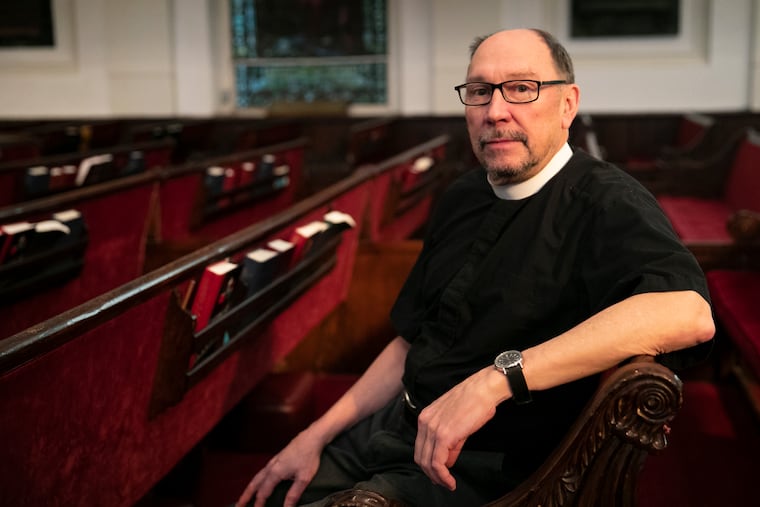‘We won’t have Rodger’: After 40 years, a beloved Gayborhood cleric will deliver his last sermon
Rev. Rodger C. Broadley retires after 40 years of leading The Church of St. Luke and the Epiphany.

Since the spring of 1980, the Rev. Rodger C. Broadley’s Sunday routine has remained the same — through the AIDS epidemic that would come to both devastate and define his congregation, to the lifesaving treatments that finally emerged, and beyond.
Before the congregation began to trickle in for the weekly 9 o’clock service at the Church of St. Luke and the Epiphany, he would sit in the rotunda to pray. It’s been his way to center himself and feel more connected to the space.
This Sunday will be his last time sitting in the burgundy, tufted pews. The beloved cleric is retiring as the church’s rector (the Episcopal term for pastor). At 68, he’s ready for a turning point in his spiritual journey after four decades in his post, the longest tenure of any rector in the Center City church’s 185-year history.
“I wanted to retire while I still had the emotional and spiritual flexibility to make that adjustment,” Broadley said as he gazed out of the large bay window in his study. “I want to be open to whatever the next thing is that I’ll be doing.”
» READ MORE: A Philly charter school bought this church building, and now it faces a preservation battle
Next steps aren’t firm for Broadley, but he’s “eager to visit other churches,” he said, and “learn what it means to be a retired person.”
When Broadley announced his retirement to the congregation in September, Mary Ellen Desmond said she wasn’t surprised but was deeply disheartened.
“There were times where I just needed pastoral care and he would always be available,” said Desmond, who has been a member of the church for almost 30 years and serves as the senior warden (a rector’s right hand) at St. Luke’s. “That’s the one thing that is going to be hard for me to come to terms with. We won’t have Rodger.”
Desmond said the process of naming Broadley’s successor won’t be easy — or complete for at least another year. In accordance with Episcopal tradition, Broadley won’t return to St. Luke’s for at least three years — not as an officiant or even as a congregant — so as not to influence the church’s congregation while the new rector, or the interim one, paves their path.
By several parishioners’ accounts, Broadley’s commitment to community outreach will be the crown jewel of his legacy. An openly gay rector, Broadley bridged the gulf between faith and LGBTQ identity in Philadelphia’s Gayborhood. At the height of the HIV/AIDS epidemic, St. Luke’s became a refuge.
» READ MORE: Philly part of national effort to cut new HIV infections by 90% over 10 years
In the mid-1980s, the church began to see the first people with HIV/AIDS in the congregation and in the neighborhood. By the end of the decade, Broadley said, many of the church’s members with the virus had died. By 1995, the toll was nearly 200 parishioners. Today a collection of urns and gold-plated plaques in memory of those who died of HIV/AIDS is situated in the main sanctuary.
During the height of the epidemic, the church became “more honest and deep,” Broadley said. “We were able to build on what we knew about the stigma of HIV/AIDS. From the stigma [of the virus] itself, we learned how issues like poverty and issues facing people of color were all connected.”
Broadley also led the church in welcoming other community organizations such as Alcoholics Anonymous, Narcotics Anonymous, Philadelphia FIGHT (a health services organization), and Act Up (the AIDS Coalition to Unleash Power).
St. Luke’s membership now stands at about 300, by Broadley’s count, and “skews LGBTQ.” Many are longtime members.
» READ MORE: Local Methodists react to proposed split over LGBTQ issues
And Broadley himself "has been there almost his entire priestly career,” said Vikki Ellis of South Philly, a member of St. Luke’s since 1990. “He’s been able to refresh and renew himself over the years,” which is one of the reasons she stays year after year. “He’s stable.”
Ellis appreciates Broadley’s interpretation of the Bible and Christian virtues, and his ability to inject a sense of modernity into his sermons, she said. He’s rooted in the Bible, “and yet he’s not stuck in his expression of it.”
“We’ll miss that,” she said. “We’re as ready as we can be for the change, but we’re up for it because of what he’s poured into us.”
Broadley said his last liturgy will be delivered in the same format the congregation is used to. Hymns will be sung. Communion will be celebrated.
And then there will be one symbolic act to mark Broadley’s retirement. “I plan to take off my liturgical vestments as a sign of returning them back to the church,” he said. “The ministry now is vested in the church, and they have a responsibility to lead it forward.”